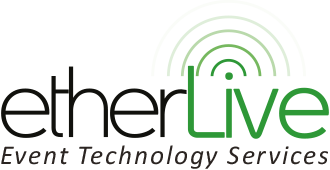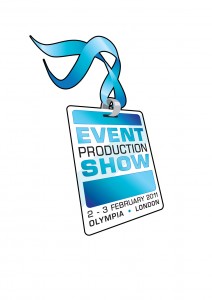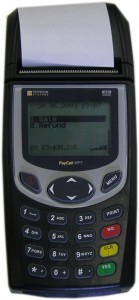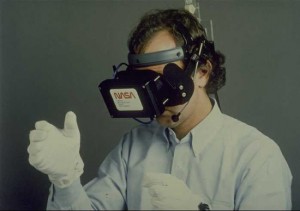![]() February 2011 Event Industry News coverage of the Crew Accreditation Management system
February 2011 Event Industry News coverage of the Crew Accreditation Management system
![]() February 2011 – New RFID technology to relieve on-site crew management issues
February 2011 – New RFID technology to relieve on-site crew management issues
The Etherlive team are now in the last stages of planning in preparation for the Event Production Show at Olympia on 2 – 3 February. We are on stand 620, on the right hand side of the main isle not far from the entrance. As usual the team will be ready to answer questions, discuss services and demonstrate equipment. With a Royal Wedding this year and the Olympics next year it is important to get services booked early – we are already seeing a knock on impact from these events, for example lead times are increasing for telecommunication services and this will get worse during the year.
Alongside our normal array of solutions for connectivity, communications, monitoring and interactive technology we will also be demonstrating three new services:
Crew Accreditation System – A contact-less RFID card (or wristband) system which makes managing crews simpler. The system uses a PC or touchscreen terminal to manage crew as they book out keys, radios, plant equipment and doubles as a crew catering system replacing those pesky paper vouchers. Multiple terminals can be used over the site such as in the catering tent and production offices. All the data is easy to manage allowing production to forecast catering requirements and track items quickly.
Dynamic Secure Wi-Fi – There has been a lot of press recently about the security of wireless networks and even though we already have a very secure system we will launching an even better solution. What’s great about it is that it’s easier for the user but more secure as every user has their own unique encryption key. Aimed at events when privacy is critical it will reside alongside our existing range of wireless services so that you can decide what level is appropriate for your event.
Communications Tower Light – Not completely new as it is in its second year of use by Etherlive but this palletised, environmentally tower light was a great success during the 2010 season so we have been improving it further. Supporting Wi-Fi and cabled networking, public address and CCTV from one unit, it is perfect for quickly deploying technology services in areas with no power. The 2011 unit now has multiple camera options with a new higher zoom and motion tracking enabled camera added to the range; and if you need high density outdoor wireless there are options for up to 750 simultaneous Wi-Fi connections off of one unit.
Take a moment to register here if you plan to come along to the show to speed up getting in and of course if you want to set-up a specific time to meet you can get in contact beforehand.
We hope to see you at the show!
Chip and pin is part of our lives. Four digits and a piece of plastic is all that’s needed to pay for anything from a morning coffee to that expensive watch for Christmas (you have got all your presents by now – right?!) The chip and pin terminals or PDQs (Process Data Quickly) have become the staple of any company who want to take larger payments at events. As the cheque looks destined to bow out (perhaps?) shortly we take a quick look at some of the key points of PDQ machines in a mobile environment as they can be the cause of much pain.
Merchant Account – Anyone who accepts payments from a card needs a merchant account. Issued by the banks it can be a lengthy application process so leave plenty of time when applying. In our experience to keep a merchant account live you’ll need to have a PDQ of some type – this is typically a phone line based model you can keep in the office. The merchant account and terminal rental have a monthly fee normally around £20.
Transaction Fees– The downside of card payment are the transaction fees, typically for credit cards these are around 2.5% of the transaction amount. For debit cards the fee is normally a fixed amount of around 35p per transaction.
Mobile Terminals – If you are going to be using your PDQ out and about all the time then go for a mobile terminal as your default instead of a telephone line based model. The main reason people don’t go for these all the time is because mobile units (by which I mean GPRS connected) have a higher monthly charge just like a cellular data card.
GPRS Connectivity– When looking at a mobile terminal you’ll need to select the right type of connectivity to keep it working. A GPRS terminal works in a similar to a cellular Internet data dongle. Connected to the cellular data network the unit will work anywhere with mobile phone reception for whichever mobile operator you select. This is great for smaller stands who operate at venues or locations where the amount of attendees is not excessive, by which I mean the cellular network will continue to operate. The issue here is as the attendee numbers for the event increase the mobile phone network becomes slower to respond and may become overloaded. We have all experienced not being able to make calls at big events – the same problem exists for the GPRS terminal – it will just stop working, often at a critical point. In 2010 we have seen a significant rise in the number of events that have experienced problems with GPRS devices due to the network being overloaded.
Wired/Wi-Fi Connectivity – The latest PDQ units are now shipping with Wi-Fi or cabled network connectivity built in. For those people who work at large events when the mobile phone network is not reliable this type of connectivity is a reliable way of ensuring you can continue to process transactions regardless of the mobile phone networks. The challenge here is the event needs to have a Wi-Fi or wired network in place – many of the larger events now do but the best thing to do is check beforehand.
Short Term Terminal Rental– Many companies like the option of renting PDQ machines for a short period, especially for events where they need Wi-Fi or GPRS units. There are several companies that rent units (including ourselves) but it is important to note there is a lead time of around 14 days to get your merchant id added to the temporary unit and some banks have additional restrictions which need to be removed. For PDQ rental you still need to have your own merchant id.
So whatever choice you make a PDQ terminal can be invaluable for any business on the road. Increased transaction amounts and greater security are just some of the obvious benefits but beware the pitfalls and make sure you plan well in advance of when you need the service operating. As always we are happy to provide advice on types of machine, connectivity, pros and cons etc. to help you make the right decision for your business.
![]() December 2010 – Event Production Show Hat Trick for Etherlive
December 2010 – Event Production Show Hat Trick for Etherlive
![]() December 2010 – Key technology considerations for event organisers in 2011
December 2010 – Key technology considerations for event organisers in 2011
This month saw the 100th anniversary of International Woman’s Day, and I had the fortune to start the day by attending a business breakfast in the beautiful surroundings of Gordon Ramsay’s D’Oyly Carte private room at The Savoy.
The event brought together a number of leading women in the vent, hospitality and travel industries to discuss the opportunities and challenges facing women working in the sector. I was happy to agree with a number of people around the table and say that yes, the industry may have a predominately male headcount, but is by no means “male dominated”. It was good to hear of other companies like ours where in reality- this, and the glass ceiling, may at last be becoming an out-dated concept. It was interesting to meet with such a successful and clear minded group, and the topics up for debate (and opinions thereon… ) were thought-provoking and varied.
Due to this, and possibly the lovely breakfast and tour of the amazing kitchens… the time flew by. Unfortunately this meant we did not get to fully discuss a particular agenda topic I would have been keen (having lately returned to the IT industry) to learn the groups views on – The impact of technology on the work/life balance.
Travelling back on assorted tubes and trains I used the quiet time to get to grips with my new smartphone- catching up with emails, reviewing documents, checking news feeds etc and downloading random free stuff like every App Store newbie. As I happily used my new Tube App and Location Me to get on the right route home, it got me thinking… I wondered how the different people I’d met that morning would be using and experiencing technology in general, and what the next “hot technology” to hit the masses would be.
For example it is perhaps not too far away that we may no longer expect to exchange business cards as I did that morning, but instead soon you may use your phone to take a photo of a small “QR code” (a digital picture code) perhaps held in someone’s wallet panel, and suddenly – their details appear straight into your contacts list, and an email has been sent to them with yours! Similarly, there is much developments surrounding cashless and NFC payment systems being linked to phone devices, not cards. When will I be able to pay for my journey and my coffee by passing my phone (ready in hand thank you Tube Map) over an exit barrier or shop counter?
These types of technologies are already being trialled in the events and travel industry and I look forward to them becoming mainstream in the future.
I can’t answer as to the other attendees’ experiences of technology to date, but I will probably ask a couple of them out of interest. Having only recently entered into the realm of Twitter & LinkedIn, I have already been contacted by a few of the other breakfast attendees (and some old friends!) and have found connecting my face to face networking with my digital/social media really does throw open the doors for informal but invaluable knowledge sharing and keeping in touch with my contacts, friends and the world in general.
Its life Jim but not as we know it. As the virtual world becomes omnipresent it’s fascinating to see new cool things that are going on to bring content from the virtual world seamlessly into the real world. We are working with several customers to explore how events can make use of some of these technologies and capabilities. Some current examples include:
- Augmented Reality – Worth a blog post on its own, this is hugely exciting even if it sounds a bit way out. A great example of this is imagining yourself as a tourist in a new city. You hold your smartphone camera up to a building in front of you, the device searches the internet and provides you information about its history. This won’t ever replace a good guide but it does mean that if you want to tour a city on your own you could do – instead of just pounding the known tourist trails you could venture to different parts of the city. Essentially you get your own personal guide. In the events market this also has some possibilities – it could work to identify your location at a festival and tell you about the music the phone is hearing (artist, get the single etc), help guide you to to different parts of a large site or exhibition or even show you where your friends are. It has also got big potential in the game/treasure hunt world.
- QR Codes – I tweeted about these a while ago. Although not a new invention, having originally been devised in 1994 and very popular in Japan, they are now becoming more popular elsewhere partly thanks to smartphones with cameras which can generally read them. They are a simple way of linking real world collateral with online content and taking the form of a more elaborate barcode which can hold textual information such as a URL. For example you can include a QR code on a poster and when someone scans this with their phone it will take them to a hyperlink or brings up a phone number to call. Not only is this an easy way to get users to a specific URL but it also provides trackback information for that advert.
- Places – I’m not convinced on the ‘check in’ features which seem to be gaining traction from FourSquare and Facebook places as I’m not sure I see the value for people to know where I have been (perhaps that’s just me!) however the recent album launch for Cheryl Cole used Facebook Places with some success by linking posters for the album to places and then getting people to check-in for entry to a competition. A similar system could work for artists who are touring or playing festivals.
Essentially all these technologies give the end user the same thing – the ability to connect what they are seeing in the digital with the real world. Whilst we might not associate immediate commercial returns what that the actual return is the free marketing gained when that experience is shared over social networking
It will be interesting to see how these technologies develop and which ones move past fads. One thing is for sure is those who can apply this successfully can run ahead of the market quickly




